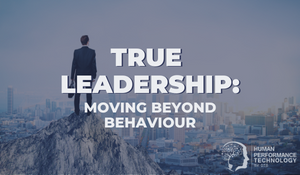Layers of Performance (Layer 7: Motivators)
This is part of the Layers of Performance framework: Click Here to read the introduction.

One of the first authors to highlight the importance of motivators was Eduard Spranger, who wrote the book Types of Men in 1928. Prior to Spranger's work, personal motivators had not been clearly defined, researched or studied.
Spranger defined motivators as a compilation of likes, dislikes, beliefs, prejudices and judgments that determine a person's view of the world. These might also be referred to as values, although there is a difference.
Values are beliefs that have special personal importance, such as those listed on an organisation's website (e.g. integrity, excellence, service, loyalty, innovation).
Everybody has personal values, but not every value motivates us to get out of bed everyday and go to the ends of the earth in order to seek its fulfilment. For example, we may say that we value the environment, but we may not be motivated enough to purchase an eco-friendly car, advocate to have a recycling program implemented at work, or attend a protest against logging in our spare time.
Motivators are the things that drive us to take action. They are the direct manifestation of our core values because only our deepest, most central values give us energy, drive, passion, and have the power to shape the direction of our lives. Only our most important values compel us to take action and can be called motivators.
In the Layers of Performance framework, we refer to the 6 motivators outlined in Spranger's work. These function like a compass and determine what we love (what we want to move towards) and what we hate (what we want to move away from).
A motivator might also be compared to a pair of tinted sunglasses. The 'lens' of the motivator is something we have on at all times, and colours everything in the world around us. The people, tasks, situations, and ideas that we encounter throughout the course of our lives will be appraised (as either stimulating or dull) according to our motivators.
Essentially, our strongest motivators determine where we will tend to find satisfaction and fulfilment in the workplace. They are also the source of dissatisfaction when they are violated or ignored. Almost all conflict in any situation stems from a motivators disconnect between the parties — be it between two people, a person and their job, or a person and their environment.
We have placed the motivators layer close to the top of the Layers of Performance, since our motivators, while not always obvious to others, have a dramatic influence on our behaviour.
Curious to Learn More:
One such tool for measuring a person's motivators is the Workplace Motivators profile. Based on Spranger's work, and then updated and revised by TTI Success Insights, this tool measures 6 core motivators. This Workplace Motivators is a part of the Talent Insights profile and helps to move our understanding beyond HOW we behave and communicate, to understand the WHY behind our actions. We believe that while our behaviours (measured by the DISC Profile) are important and should not be overlooked, DISC is not everything!
While the Motivators profile still exists, we now offer an updated version called Driving Forces. The original Motivators profile focused on six core human motivators, whereas Driving Forces expands this to twelve factors.

Theo Winter
Client Services Manager, Writer & Researcher. Theo is one of the youngest professionals in the world to earn an accreditation in TTI Success Insight's suite of psychometric assessments. For more than a decade, he worked with hundreds of HR, L&D and OD professionals and consultants to improve engagement, performance and emotional intelligence of leaders and their teams. He authored the book "40 Must-Know Business Models for People Leaders."

/motivators%20profile_%20executive%20summary.png?width=374&name=motivators%20profile_%20executive%20summary.png)

We Would Like to Hear From You (0 Comments)